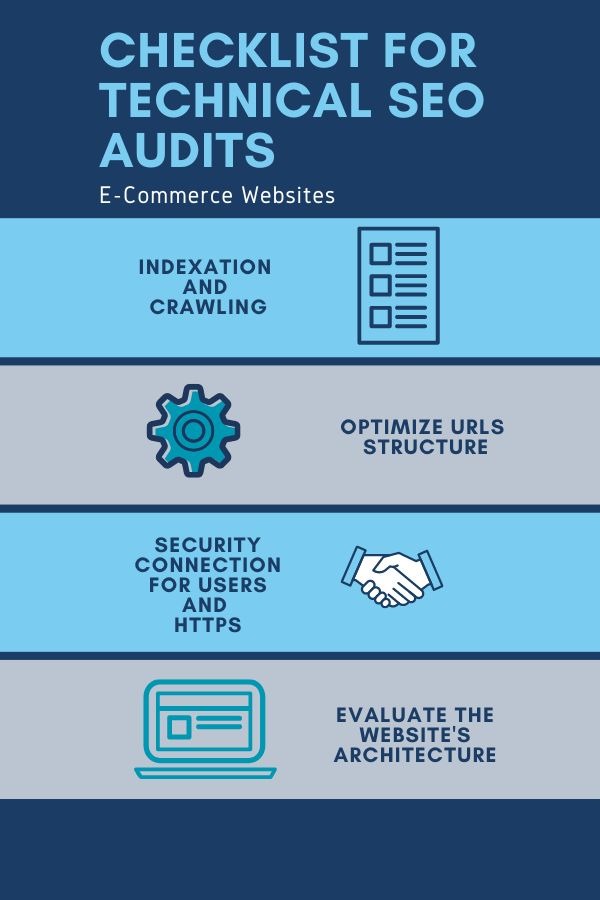In the competitive environment of online retail, having a visually appealing website with high-quality products isn’t enough to succeed. E-commerce enterprises must also focus on technical search engine optimization to get noticed in search engine results and attract new clients. Technical SEO is the process of boosting a website’s technical characteristics in order to improve its exposure and performance in search engine results.
Ecommerce technical seo is vital for optimizing various technical aspects of a website to improve its visibility and performance in search engine rankings. This includes ensuring a well-structured site hierarchy and navigation, optimizing page speed for faster loading times, ensuring mobile responsiveness, implementing structured data markup for product information, maintaining clean URL structures, addressing indexation and crawlability issues, and conducting regular technical audits.
We will discuss the significance of technical SEO for ecommerce websites in this blog. We’ll explore how these can improve your rankings and offer professional tips to help you with website optimization.
Optimizing Site speed and Mobile responsiveness
Site speed optimization is crucial for improving user experience and search engine rankings. Here are some key strategies for optimizing site speed
Optimize Images:
Compress images to minimize file size while maintaining quality. Use picture formats such as WebP or JPEG 2000 to improve compression.
Minimize HTTP Requests:
Reduce HTTP requests by integrating CSS and JavaScript files, deleting unnecessary scripts, and using CSS sprites to compress pictures.
Reduce Server Response Time:
Optimize server response times by upgrading hosting infrastructure, using content delivery networks (CDNs) to distribute content geographically closer to users, and implementing caching mechanisms like Varnish or Redis.
Minify CSS, JavaScript, and HTML:
Reduce the size of CSS, JavaScript, and HTML files by removing unneeded white spaces, comments, and line breaks. This step may be automated using minification tools such as UglifyJS and CSSNano.
Monitor and Test Performance:
Monitor site speed on a regular basis with tools such as Google PageSpeed Insights, GTmetrix, and Pingdom. A/B testing is used to measure the impact of performance changes on user behavior and conversion rates.
Mobile Responsiveness:
With the increase in mobile purchasing, maintaining a consistent experience across all platforms is critical.
Using Structured Data for E-Commerce SEO
Structured data plays a vital role in technical SEO for ecommerce which involves implementing markup languages such as Schema.org to give search engines precise information about the content of product pages. By utilizing Product schema markup, you can offer essential details like product name, description, price, availability, brand, and more, aiding search engines in understanding the specifics of your products.
This facilitates the display of rich snippets in search results, enhancing visibility and click-through rates. Additionally, implementing the Review and AggregateRating schema markup enables you to display product reviews and ratings directly in search results, increasing confidence and credibility and encouraging individuals to click through to your product pages.
Technical SEO Challenges For Online Retailers
Online retailers face several ecommerce technical SEO challenges that can impact their search visibility and overall performance.
Duplicate Content: Managing duplicate content issues arising from product variations, pagination, and syndicated product descriptions.
URL Structure Optimization: Optimizing URL structures for large product catalogs to create user-friendly and search engine-friendly URLs.
Faceted Navigation: Addressing challenges related to faceted navigation, ensuring search engines index the most relevant pages and avoid crawling unnecessary variations.
Dynamic Content: Managing dynamically generated content, such as personalized recommendations and user-generated content, to ensure proper indexation and crawlability.
Indexation Control: Controlling indexation of pages through techniques such as canonicalization, noindex tags, and robots.txt directives to prevent low-value or duplicate content from being indexed.
Technical SEO Audits: Regular technical SEO audits are conducted to discover and resolve issues such as broken links, crawl failures, and server response codes, all of which can have a detrimental influence on search rankings and user experience.
Checklist for Technical SEO Audits of E-Commerce Websites
Conducting regular technical SEO audits is imperative for ensuring the optimal performance and visibility of e-commerce websites. This checklist serves as a guide to systematically assess and address various technical aspects:
Indexation and Crawling:
Verify indexation status and address crawl errors to ensure search engines can access all essential pages. Review the robots.txt file and XML sitemap to facilitate efficient crawling and indexation.
Site Architecture:
Evaluate the website’s structure and hierarchy to ensure it is logical and easy to navigate. Assess internal linking to facilitate the flow of link equity and improve crawlability.
URL Structure:
Optimize URLs to be descriptive, user-friendly, and optimized for relevant keywords. Manage URL parameters effectively to avoid duplicate content issues and streamline indexing.
Canonicalization and Duplicate Content:
Identify and address duplicate content issues to avoid diluting search engine rankings. Implement canonical tags to consolidate duplicate content and specify preferred versions of pages.
Security and HTTPS:
Implement HTTPS to provide a secure connection for users and enhance trustworthiness. Resolve any mixed content issues and ensure all resources are loaded securely over HTTPS.

Discovering Technical SEO Tools for E-commerce
The right technical SEO tools for e-commerce are crucial for optimizing your website’s performance and increasing visibility in search results. Here are some top tools tailored for e-commerce:
Google Search Console:
Offers insights into indexing status, search queries, and crawl errors, helping e-commerce sites identify and resolve technical SEO issues.
GTmetrix:
Analyze website speed and performance with detailed reports on loading times and optimization suggestions, essential for ensuring fast performance of e-commerce pages.
Screaming Frog:
A powerful website crawler that discovers technical SEO issues like broken hyperlinks and duplicate content, making it ideal for auditing large e-commerce sites and optimizing them for better search engine visibility.
SEMrush:
Offering site audits, keyword research, and competitive analysis, SEMrush helps e-commerce businesses identify technical issues, track keyword rankings, and monitor competitors’ SEO strategies.
Ahrefs:
Providing insights into backlink profiles, keyword rankings, and content performance, Ahrefs helps e-commerce sites analyze technical SEO health and identify opportunities for improvement to enhance search engine visibility.
Conclusion
In summary, mastering technical SEO is indispensable for the growth and success of e-commerce ventures. Businesses may improve their online presence and create real results by leveraging specific technical SEO solutions designed for e-commerce. As the digital environment evolves, investing in technical SEO for e-commerce is critical for long-term development and competitive advantage in today’s dynamic online marketplace.
FAQs
What precisely is the objective of technical SEO?
The major goal of technical SEO is to optimize a website’s technical characteristics in order to increase its exposure and performance in search engine rankings. This involves ensuring that search engines can crawl, index, and analyze a website’s information efficiently.
What’s the factor in technical SEO?
Technical SEO encompasses various factors, including:
How Does SEO for E-Commerce Differ?
SEO for e-commerce involves optimizing product pages, category pages, and other e-commerce-specific content to improve visibility and drive sales. Unlike traditional websites, e-commerce sites often have a large number of product pages, which require careful optimization of product titles, descriptions, and metadata.
What is the commonly overlooked aspect of SEO for e-commerce brands?
Optimizing product pages for long-tail keywords and user intent is a frequently ignored part of SEO for e-commerce businesses. While it is critical to target high-volume keywords, many e-commerce sites need to look into the possibility of ranking for more specialized, less competitive phrases that match the searcher’s intention.
How do I improve my website for technical SEO?
Improving website technical SEO includes improving speed, mobile friendliness, URL structure, and structured data and conducting frequent audits to identify issues such as broken hyperlinks and duplicate content.

